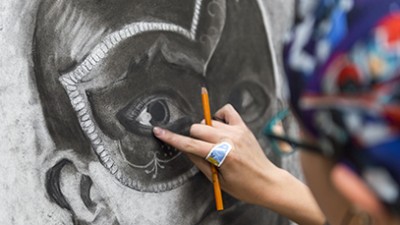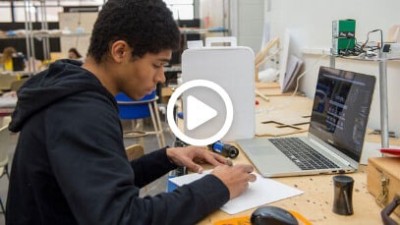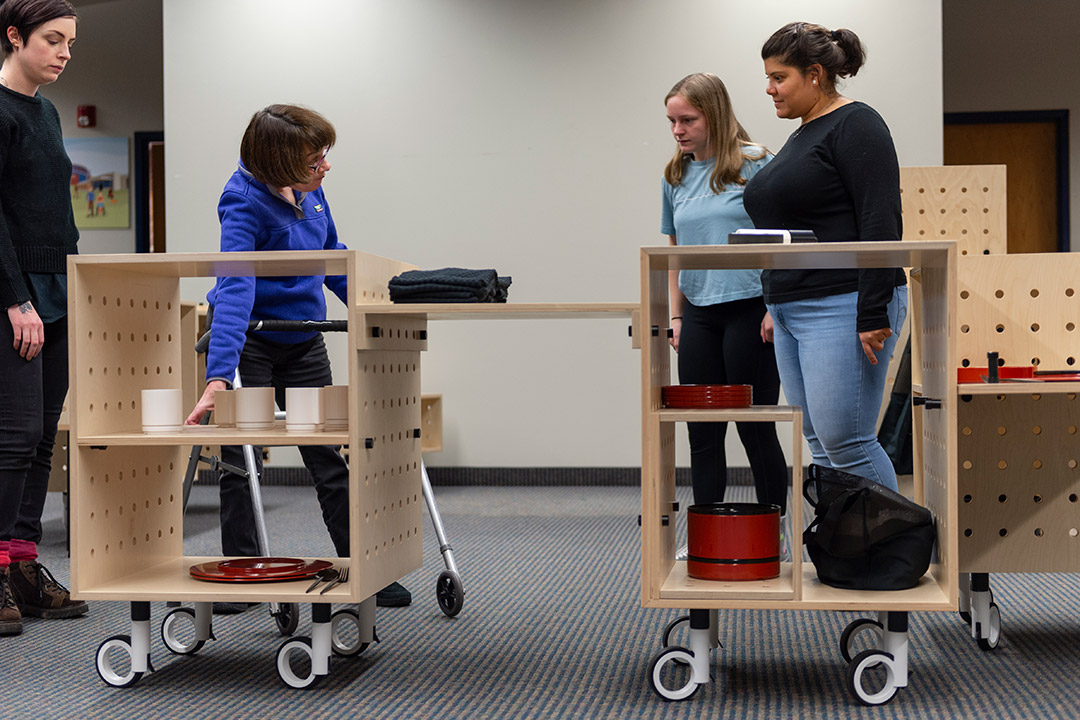POSTPONED: RIT hosts Conference on Effective Access Technology March 17
Community and local organizations focused on accessible technologies invited to attend interactive conference
Elizabeth Lamark
RIT students Andrea Gonzalez, far right, and Emma Canning, center, demonstrate the capabilities of MO:KI, a mobile kitchen, to Ann Kurz, an Al Sigl Community of Agencies board member who has cerebral palsy. A variety of cutting-edge technologies designed to enhance accessibility for individuals across a wide range of physical and cognitive challenges will be on display March 17 at the Conference on Effective Access Technology at RIT.
UPDATE: March 11: The Effective Access Technology Conference originally scheduled for March 17 has been postponed. Updated information will be available on the conference website, including information regarding reimbursement of registration fees.
From furniture and toys that assist children with special needs to car seats that help people with mobility issues enter and exit vehicles safely, cutting-edge technologies designed to enhance accessibility for individuals across a wide range of physical and cognitive challenges will be on display March 17 at the fifth Conference on Effective Access Technology at Rochester Institute of Technology’s MAGIC Spell Studios.
Data gathered from the World Health Organization and the World Bank estimates that more than 1 billion people in the world live with some form of disability, of whom nearly 200 million experience considerable difficulty in their daily lives. RIT is poised to become a leading research and development organization in the field of accessible technologies, while creating strong collaborations with end-users, care providers and industry.
The conference, which is open to the community, features interactive exhibits, poster presentations and panel discussions that showcase projects designed at RIT and the National Technical Institute for the Deaf. Departments and initiatives such as the Construct@RIT makerspace and LiveAbility Lab, a partnership between RIT and Al Sigl Community of Agencies in Rochester, will also exhibit accessibility designs and prototypes.
Among the numerous exhibits and poster presentations are 3D-printed prostheses for underprivileged populations; a system of interactive modules for children with special needs that provides sensory interaction for educational game development; a self-driving wheelchair using brain wave signals to provide independence for those impacted by stroke or other injuries that prevent the use of a joystick; and devices created by NTID’s Center on Access Technology.
A keynote luncheon led by internationally recognized designer and alumna Patricia Moore ’74 (industrial design) will explore the future of accessibility, and, in order to facilitate the vision of partnership with industry, invited representatives will explore emerging trends, gaps, challenges, and potential means of productive engagement between designers, manufacturers, service agencies, and end users.
New this year, registrants can share their own accessibility challenges in advance; experts, caregivers and care provider organizations will address the challenges during the conference.
“This conference will provide a forum for examining the past, present and future direction of innovation and collaboration for developing the next generation of devices and systems to meet the needs of our community,” said Dan Phillips, an associate professor in the Kate Gleason College of Engineering and faculty associate for the Partnership for Effective Access Technology Research and Development at RIT. “At RIT, we are proud to showcase how the magnificent combination of technology, art, and design can make a difference in people’s lives.”
For more information and to register, go to the Effective Access Technology Conference webpage.









